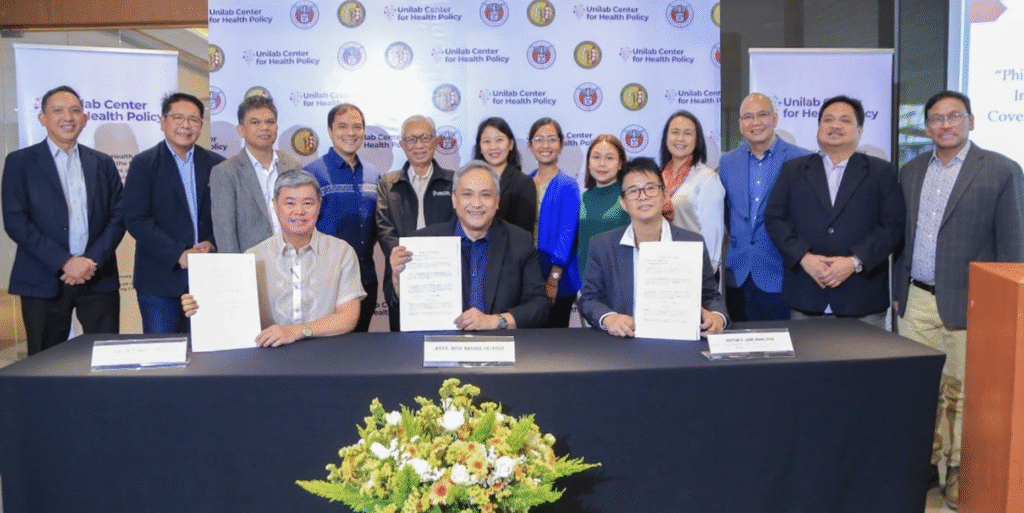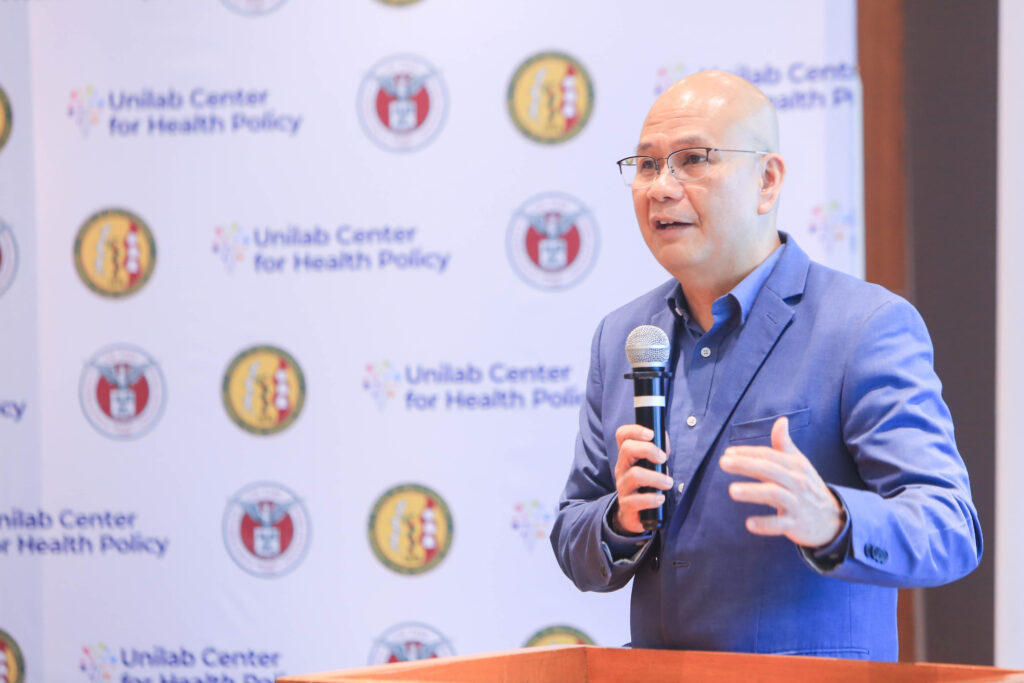
Standing from L to R:Manolet Montinola, member steering committee Unilab Center for Health Policy; Dr. Jovencio Villaflor, Medical Director, Dagupan Villaflor Doctors Hospital; Dr. Guido David, Professor, Mathematics and Data Science of UP Diliman; Dr. Rizaldy Capulong, Professor, Computer Science, University of the Philippines Diliman; Dr. Enrique Ona, Chairman, Unilab
Center for Health Policy Advisory Council and former Department of Health Secretary; Ms. Maribeth Adsuara, Executive Assistant III, Office of the Executive Vice-President and Chief Operations Officer of PhilHealth; Dr. Maria Franchina Ruby, Medical Specialist III, PhilHealth; Ms. Leilani Mae S. Formadero, Acting Senior Manager, International and Local Engagement Department, PhilHealth; Dr. Leizel Lagrada, Associate Professor, College of Public Health, University of the Philippines Manila;; Ruben A. Basa, Program Director, Unilab Center for Health Policy; and Dr. Vicente Bernardo, Consultant, Dagupan Villaflor Doctors Hospital; Dr. Jaime Caro, Professor, Computer Science, University of the Philippines Diliman
In a significant move to advance Universal Health Care (UHC) in the Philippines, the Unilab Foundation, Inc. and the University of the Philippines (UP) Manila have signed a memorandum of agreement (MOA) to jointly study and develop a supplemental benefits package for PhilHealth members. This initiative marks one of the most comprehensive collaborations to date between the private sector and the national university on UHC policy.
Titled “PhilHealth Benefits Enhancement: Assessing the Implementation of Supplemental Insurance Coverage for PhilHealth Members,” the study will be the first of its kind within the UP System to engage multiple departments. It is funded by the Unilab Center for Health Policy (UCHP), the policy thinks tank of the Unilab Foundation, and includes academic partners from UP Manila, UP Diliman, and West Visayas State University.
The research focuses on a long-overdue provision under Section 11 of the UHC Law, which authorizes PhilHealth to establish and manage a supplemental benefit fund. Although enacted in 2019, this provision has seen little progress—something this project aims to change.
“This MOA is more than a formal agreement—it reflects a shared vision and deep commitment,” said Atty. Jose Maria A. Ochave, Executive Director of the Unilab Foundation. “Change happens through collaboration, not from the sidelines. Our role is to demonstrate that what we propose can work in the real world.”
Ochave emphasized the government’s crucial role in implementing large-scale reforms, noting that private organizations and civil society must pilot practical, scalable solutions that public agencies can later adopt. “Only government has the resources and reach to drive systemic change. Our job is to show them it can be done.”
Responding to the Call for Local Health Reform
This effort directly responds to Health Secretary Teodoro Herbosa’s call for local stakeholders to actively contribute to national health priorities. In recent statements, Herbosa stressed that health financing should no longer rely solely on international aid.
UCHP has taken this message to heart. Program Director Ruben “John” Basa explained that the center was designed as a non-commercial platform to foster partnerships between public and private institutions in pursuit of impactful health reforms.
“To revive momentum for UHC, we needed a space for joint action. That’s why the Unilab Foundation created UCHP,” Basa said.
The study builds on UCHP’s recent 30-year review of the Philippine National Health Accounts (PNHA), which found that PhilHealth’s share of total health expenditure dropped to just 10.2% in 2023—well below target. Meanwhile, out-of-pocket spending remains high at 45%, far exceeding the government’s goal of reducing it to 30%.
“This project addresses that imbalance,” Basa noted. “The supplemental benefit fund is already within PhilHealth’s mandate. Our goal is to help design a package that’s evidence-based and practical to implement.”

UP Leads Policy-Driven Academic Collaboration
UP Manila is taking a leadership role in the initiative, which Chancellor Dr. Michael Tee described as a model for “Academe-Government-Industry engagement.” He emphasized that UP’s role extends beyond education into public service and policymaking.
“This is how we ensure UP’s medical and scientific expertise reaches even the most underserved communities,” Dr. Tee said. “This study is built for real-world impact—something we can defend and champion to truly expand healthcare access.”
He also shared that the idea was born from a brainstorming session earlier this year. “We measure success by implementability. If it doesn’t improve lives or work in practice, then it’s not worth doing.”
PhilHealth Prepares for Rollout
As both a partner and potential implementer of the project’s outputs, PhilHealth has expressed full support. Dr. Maria Franchina Ruby, Medical Specialist under the Office of the Executive Vice President and COO, said the study aligns with PhilHealth’s roadmap to fulfill its UHC mandate.
“This research will inform policy and operations as we work toward fulfilling Section 11 of the UHC Law,” Ruby stated.
She shared that the agency aims to roll out the supplemental benefits program within the year. “Once the research concludes, we’re targeting to publish policy guidelines within three months.”
The package under review aims to reach Filipinos typically excluded from commercial insurance offerings. “This will directly benefit those who can’t afford private insurance, helping to ease the financial burden of healthcare,” she added.
Data-Driven, Multisectoral Reform
Leading the research is Dr. Hilton Lam of the UP Manila National Institutes of Health, with contributions from PhilHealth senior leadership. The academic team includes Dr. Rizaldy Capulong and Dr. Jaime Caro of UP Diliman, Dr. Guido David of the UP Institute of Mathematics, and Dr. Joselito Villaruz of West Visayas State University.
Over six months, the team will develop a supplemental benefits design, costing model, and implementation strategy. These outputs will be submitted to PhilHealth and the Department of Health for review and adoption.
The initiative complements UCHP’s work on other national health priorities, including the One Hospital Command Center and research on health financing and performance-based payments.
“We only commit to projects we can finish. And when we commit, we go all the way,” Ochave said.
A Shared Commitment to Lasting Change
The MOA signing was attended by representatives from Unilab Foundation, UP Manila, and PhilHealth. Signatories included Atty. Ochave, Dr. Tee, and Dr. Lam. PhilHealth was represented by Dr. Ruby, Ms. Maribeth Adsuara, and Senior Manager Lei Formadero. Among the witnesses were Dr. Jovencio Villaflor, Dr. Bernie Bernardo, and members of the UP and UCHP advisory teams.
As the study begins, it is being closely watched as a potential model for how the academe, private sector, and government can work together to create meaningful, scalable reforms.
“Honor and excellence only matter when used to serve,” Dr. Tee concluded. “And this is how we serve—through policy, science, and partnerships.”



